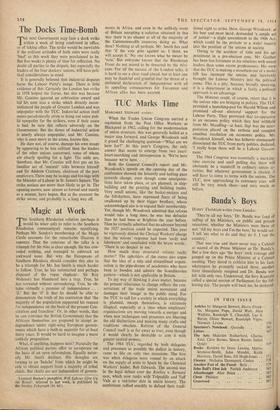Magic at Work
THE Southern Rhodesian solution (perhaps it would be wiser only to refer to the Southern Rhodesian communiqud) remains mystifying. Perhaps Mr. Sandys's membership of the Magic Circle accounts for the remarkable illusions it conveys. That the outcome of the talks is a triumph for Sir Alec is clear enough. He has con- ceded nothing, and managed to sidetrack an awkward issue. But why the Europeans of Southern Rhodesia should consider this also to be a triumph for Mr. Ian Smith is much harder to follow. True, he has outsmarted and perhaps disposed of the rogue elephant: Sir Roy Welensky has blundered into a trap. True, he has retreated without surrendering. True, he ob- tains virtually a promise of independence . . . 'if.' But the 'if' is that he should be able to demonstrate the truth of his conviction that 'the majority of the population supported his request for independence on the basis of the present Con- stitution and franchise.' Or, in other words, that he can convince the British Government that the Africans themselves are prepared to accept in- dependence under right-wing European govern- ments which have a built-in majority for at least thirty years. It would be hard to imagine a more unlikely proposition.
What, if anything, happens next? Naturally the African political parties offer to co-operate on the basis of an open referendum. Equally natur- ally Mr. Smith declines. His thoughts are turning to an 'Indaba' from which he might be able to obtain support from a majority of tribal chiefs. But chiefs are not independent of govern-
Leonard Beaton's pa phlet, Will Labour Give Up the Bomb?, referred to last week, is published by the Sunday Telegraph (Is. 6d.). ments in Africa, and even in the unlikely event of Britain accepting a solution obtained in this way there is no chance at all of the majority of the Commonwealth countries doing so. What then? Nothing at all perhaps. Mr. Smith has said that 'if the vote goes against us, I think we will accept it.' No one knows what he meant by 'vote.' But everyone knows that the Rhodesian Front do not intend to be thwarted by the Afri- cans. For all the success of the London talks, it is hard to see a clear road ahead, but at least one may be thankful and grateful that the threat of a unilateral declaration of independence with all its appalling consequences for European and African alike has been averted.


































 Previous page
Previous page